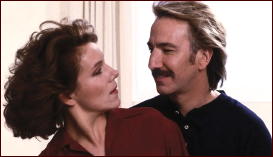Wed 5 Oct 2016
A Movie Review by Dan Stumpf: TRULY, MADLY, DEEPLY (1990).
Posted by Steve under Films: Drama/Romance , SF & Fantasy films[10] Comments
TRULY, MADLY, DEEPLY. BBC Films, UK, 1990. Samuel Goldwyn, US, 1991. Juliet Stevenson, Alan Rickman, Jenny Howe, Carolyn Choa, Bill Paterson, Christopher Rozycki, Keith Bartlett, David Ryall, Stella Maris, Ian Hawkes, Deborah Findlay. Screenwriter-director: Anthony Minghella.
You could not do much better than Truly Madly Deeply, a film I urge you all to rush right out and rent or buy. Now I realize I may be a well-known sucker for Love Stories, but I tell myself I’ve toughened up some in the last few years. Bushwah: This thing had me choking back big wet sobs almost as soon as it started.
Plot-wise, Truly is sort of like Ghost for Grown-ups: Juliet Stevenson, a remarkably sensitive actress of whom I’ve never heard, has the Demi Moore part, a woman whose lover has been suddenly and senselessly taken from her. The film takes rather a bit of time detailing the crippling Blue Funk into which she’s fallen, but she’s a good enough actress that I didn’t mind.

Then, back into her life, for no apparent reason whatsoever, and with a burst of absolutely no special effects at all, comes the ghost of her Departed played with quirky relish by Alan Rickman, who is best known as the baddie in Die Hard, Quigly Down Under and Robin Hood, Prince of Thieves. Given a chance to do an out-and-out Good Guy for a change, Rickman wisely plays it cool and slightly aloof, never actually reaching out for the sympathy Patrick Swayze demanded in Ghost, but getting it anyway.
The similarities don’t end there. Truly even revives an obscure 60s Rock ‘n’ Roll song, and the duet/dance that the two leads do to it is every bit as memorably bittersweet as “Unchained Melody” was in Ghost.
The major difference, in fact, is in the Plot. There’s no fast-paced pulp-novel, edge-of-the-seat story moving Truly to a gripping conclusion. Instead the movie turns into sort of an allegory for the heroine’s adjusting to Loss and getting on with her Life. She simply learns (Warning!) that you just can’t keep on loving someone who’s dead the way you loved them when they were alive. (End of Warning!)
Hmmm. Like most Great Revelations, this one’s obvious enough to seem profound when you put it right. And Truly, Madly, Deeply puts it across beautifully.
October 5th, 2016 at 11:23 am
Note to Mr. Stumpf:
Look up a recent film called Pierrepoint: The Last Hangman, in which Timothy Spall plays the title character.
Juliet Stevenson portrays Mr. Pierrepoint’s wife, whose character could not be more different in manner or attitude than the Truly, Madly, Deeply leading lady.
This is an actress.
October 5th, 2016 at 11:46 am
I remember a group of us rented this thinking it was a comedy. All of us (even the guys) ended up sobbing! Blockbuster’s categories could not be trusted. I’d also add that Alan Rickman is probably best known now (other than being one of 2016’s most painful casualties) as Snape in the Harry Potter series.
October 5th, 2016 at 3:17 pm
This was written some time back. I don’t even know if TMD is available on DVD
October 5th, 2016 at 3:21 pm
That’s one of my favorite films and one of the few (of my favorites) that I don’t have in my collection. It’s good to be reminded of it by such a fine review and I’ll try to track down a copy.
October 5th, 2016 at 8:53 pm
Superb film though it was hard when I first saw it after losing my wife. A tribute to it that it was so good I stuck with it.
October 5th, 2016 at 10:04 pm
1989-90 was a period of small British films receiving some success in America. Films such as MY LEFT FOOT, SHIRLEY VALENTINE, SHELTERING SKY, THE KRAYS, etc.
Juliet Stevenson CBE remains one of British most underrated actress. She has been admired for her work on the British stage, film and TV. This role got her nominated for best actress in BAFTA awards.
Reportedly this film began as a TV movie and was the directorial debut of Anthony Minghella who would win the Oscar for Best Director for the film THE ENGLISH PATIENT. He would die in 2008 at the age of 54.
October 6th, 2016 at 1:41 am
To explain Dan’s comment #3, the reviews of his that I post on this blog are a mixture of new ones that he’s writing now and ones I pick out of his many years’ worth from DAPA-Em sines, some going waaaaaaay back. This was one of the old ones. It’s good to know it struck such a welcome chord with so many people.
October 6th, 2016 at 1:44 am
This is not the best of news. The cheapest copy of this movie on Amazon is $58.87, and that one’s in only Good condition.
October 6th, 2016 at 3:45 am
I found my copy (VHS) years ago for $1 at a video store that was going out of business.
October 6th, 2016 at 6:29 am
I know I noticed it playing on one or another of the pay cable channels recently. If it’s on again I’ll let you know.